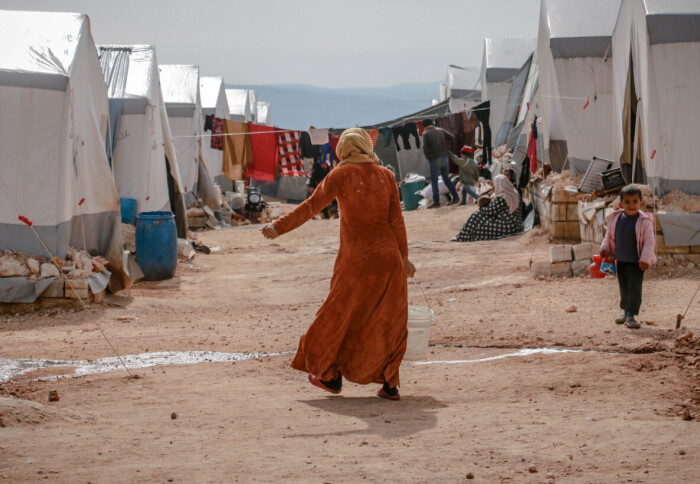New global initiative to help transform humanitarian response in conflict zones

The Jameel Institute and LSHTM launch a new initiative that will deliver crucial data to enhance humanitarian aid in conflict zones.
The Jameel Institute at Imperial College London and the London School of Hygiene and Tropical Medicine (LSHTM) announced today the launch of a new initiative that will deliver critical data – including on traumatic injuries, malnutrition, mortality and vaccination planning – to humanitarian organisations and policymakers amid crises to help them effectively prioritise aid response.
Named the Jameel Institute – Realtime Intelligent Support for Emergencies (JI-RISE), the initiative is supported by Community Jameel, an international organisation that advances science and learning and co-founder of the Jameel Institute, and expands on work previously funded by the Foreign, Commonwealth and Development Office (FCDO) to model future mortality rates in Gaza.
Deployed initially in Gaza and Sudan and with the potential to operate worldwide, JI-RISE will collaborate with a consortium of humanitarian organisations and research institutions, including the World Health Organization (WHO), the United Nations Office for the Coordination of Humanitarian Affairs (OCHA) Centre for Humanitarian Data, Médecins Sans Frontières and the Geneva Water Hub. In this initial phase, JI-RISE will seek to help hundreds of thousands of people in Gaza and Sudan, with the potential to further support millions of the most vulnerable people worldwide.
A team of 24 researchers from Imperial and LSHTM will initially collaborate on JI-RISE, including staff working with the WHO Health Emergencies Programme to support the WHO’s disease outbreak response plans in humanitarian emergencies, such as ongoing efforts to tackle an outbreak of polio in Gaza.
"Our mission is to create robust models, ensuring that decision-making processes for allocating scarce resources are more transparent, accountable and, most importantly, focus on the most vulnerable people.” Dr Oliver Watson
JI-RISE will also support displaced Gazan public health researchers, who will join the JI-RISE team and contribute to its mission to improve public health response during crises.
The team will work with humanitarian agencies to enhance the delivery of specific aid programmes in conflict zones. To better understand the health impacts of disrupting routine vaccinations, the JI-RISE team will develop a planning tool to visualise the timelines and risks associated with these disruptions. JI-RISE will additionally provide historical mortality estimates and develop predictive models to strengthen Médecins Sans Frontières’ medical interventions for traumatic injuries.
Dr Oliver Watson, lecturer and Eric and Wendy Schmidt AI in Science fellow at Imperial College London and leader of the JI-RISE initiative, said: “In conflict zones like Gaza, the lack of detailed data on health impacts can hamper effective responses. While the immediate effects of conflicts are visible, the broader health repercussions due to disrupted services are poorly understood. Our mission is to create robust models to understand these impacts, ensuring that decision-making processes for allocating scarce resources are more transparent, accountable and, most importantly, focus on the most vulnerable people.”
Dr Bhargavi Rao, Clinical Associate Professor in Humanitarian Health at LSHTM and co-principal investigator of the JI-RISE project said: “Sadly over the past decade conflicts have become longer and more violent with limited humanitarian access and disruptions to healthcare. Projects such as this are critical to enable humanitarian actors to better understand and plan for more effective responses given the overwhelming needs and constrained resources. Our aim is for the outputs of this project to be applicable beyond the current crisis in Gaza and we are grateful for the support of field colleagues to ensure they are fit for purpose and ready for operational use.”
George Richards, director of Community Jameel, said: “Non-combatants caught up in conflict rely on humanitarian aid to survive terrible suffering – for civilians in Gaza and Sudan, this includes traumatic injuries, starvation and outbreaks of infectious disease. JI-RISE uses the power of data modelling to cut through the fog of war and give humanitarians a clearer picture of what is needed, by whom, when and where – thereby helping deliver aid more effectively and saving lives.”
"JI-RISE uses the power of data modelling to cut through the fog of war and give humanitarians a clearer picture of what is needed, by whom, when and where – thereby helping deliver aid more effectively and saving lives.” George Richards
The Jameel Institute at Imperial is a centre of excellence founded in 2019 by Imperial and Community Jameel to combat disease threats worldwide. Over 100 mathematical modellers, epidemiologists and other researchers from across Imperial collaborate with the Jameel Institute on its pioneering work. The grant from Community Jameel to establish JI-RISE is the largest gift to-date received by Imperial in response to the Gaza crisis.
The concept for JI-RISE was developed following a roundtable meeting in February 2024, co-chaired by Mark Bryson-Richardson MBE, the Foreign Secretary’s Representative for Humanitarian Affairs in the Occupied Palestinian Territories, and George Richards, director of Community Jameel, that brought together scientists and humanitarians to harness British science for the Gaza emergency.
Article text (excluding photos or graphics) © Imperial College London.
Photos and graphics subject to third party copyright used with permission or © Imperial College London.
Reporter
Press Office
Communications and Public Affairs
- Email: press.office@imperial.ac.uk

